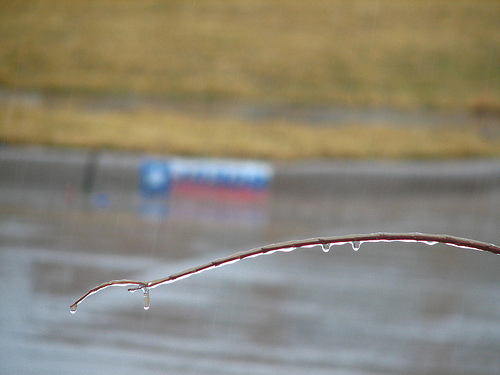By Kirsten Bokenkamp
 Do you ever find yourself in the grocery store stuck in a moment of indecision? Should you go with the $2 conventionally grown – flawless enough to win a beauty contest – cantaloupe, or the $4 smaller, uglier, but organic one; a regular tube of toothpaste for $3.50 or the organic brand that costs double the price for half the amount; Wolaver’s sustainably produced organic beer for $9, or good old Lone Star for half the price? The marketplace sure doesn’t make it easy on our wallets to do the earth-friendly thing – that’s for sure.
Do you ever find yourself in the grocery store stuck in a moment of indecision? Should you go with the $2 conventionally grown – flawless enough to win a beauty contest – cantaloupe, or the $4 smaller, uglier, but organic one; a regular tube of toothpaste for $3.50 or the organic brand that costs double the price for half the amount; Wolaver’s sustainably produced organic beer for $9, or good old Lone Star for half the price? The marketplace sure doesn’t make it easy on our wallets to do the earth-friendly thing – that’s for sure.
True, organic products are almost always more expensive than their conventional counterparts and it is not unanimously agreed upon that they are always safer to eat, or that they offer greater health benefits. But one thing is certain: Organic farming practices reduce harmful greenhouse gases that contribute to climate change.
Organic agricultural practices reduce carbon dioxide emissions by sequestering carbon in the soil. In Europe it has been shown that organic farming decreases greenhouse gas emissions by 48-66%. According to the Rodale Institute, “if all 434 million acres of U.S. cropland were converted to organic practices, it would be the equivalent of eliminating 217 million cars” from the road. The University of Puget Sound shares similar findings: If all corn and soybeans were raised organically, 580 billion pounds of CO2 would be removed from the atmosphere.
Some argue that we would not be able to feed the almost 7 billion people on the planet with strictly organic practices, but many studies actually show increased yields from organic farming. And, let’s be honest – with more than enough food to feed all people on earth, more than a billion people are still not getting enough food to eat – which leads one to believe it is a problem of distribution and access, not of quantity. An added bonus of organic farming is that it is more labor intensive, which would help decrease the current rate of unemployment.
But back to the subject at hand. Organic farming:
- Promotes healthy soil, which reduces erosion and increases soil nutrient retention;
- Reduces ground water pollution attributed to industrial agricultural practices that often lead to various problems from the threat to public health caused by pesticide ridden water coming out of our kitchen sinks to the dead-zones as seen in the Gulf of Mexico and Chesapeake Bay;
- Maintains biodiversity which helps crops naturally resist diseases and adapt to different weather patterns;
- Collects 180% more solar energy than conventional agriculture – which saves 64 gallons of fossil fuel per hectare.
Are you convinced? If so, start shopping more at an organic-foods store, or ask the manager of your neighborhood store to increase the amount of organic products on the shelves. (While organic is important in and of itself, buying fresh and local will always cut down on carbon emissions. Frozen foods take 10x the energy to produce, and buying local can cut emissions by up to 20%.)
It doesn’t stop with food,either. According to the Pesticide Action Network, “conventionally grown cotton uses more insecticides than any other single crop and epitomizes the worst effects of chemically dependent agriculture. Each year cotton producers around the world use nearly $2.6 billion worth of pesticides — more than 10% of the world’s pesticides and nearly 25% of the world’s insecticides”. Wow – pretty gross! Luckily, a growing number if stores sell clothes made with organic cotton (Patagonia is a good one). Don’t have organic clothing stores at your fingertips? Check out online sources, such as the Organic Mall. Finding that buying new, organic clothing doesn’t fit in your budget? Find a thrift store – buying used clothes is even more environmentally friendly than buying organic ones.
As environmentally aware consumers, the more we demand organic goods, the more the market supply will adapt to fulfill our needs, the more inexpensive these products will become, and the happier our planet will be. Think about changing products from your shampoo to your coffee; from your bed sheets to your sunscreen; and from your carrots to your wine. It all makes a difference. Next time on Green-up your life: how composting reduces global warming.
Read Full Post »

 Do you ever find yourself in the grocery store stuck in a moment of indecision? Should you go with the $2 conventionally grown – flawless enough to win a beauty contest – cantaloupe, or the $4 smaller, uglier, but organic one; a regular tube of toothpaste for $3.50 or the organic brand that costs double the price for half the amount; Wolaver’s sustainably produced organic beer for $9, or good old Lone Star for half the price? The marketplace sure doesn’t make it easy on our wallets to do the earth-friendly thing – that’s for sure.
Do you ever find yourself in the grocery store stuck in a moment of indecision? Should you go with the $2 conventionally grown – flawless enough to win a beauty contest – cantaloupe, or the $4 smaller, uglier, but organic one; a regular tube of toothpaste for $3.50 or the organic brand that costs double the price for half the amount; Wolaver’s sustainably produced organic beer for $9, or good old Lone Star for half the price? The marketplace sure doesn’t make it easy on our wallets to do the earth-friendly thing – that’s for sure. For your Earth Day enjoyment, Public Citizen, Sierra Club, and Environmental Defense have written a joint Op-Ed that has been published in both the Austin American Statesman & the Houston Chronicle. So on this day of celebration,
For your Earth Day enjoyment, Public Citizen, Sierra Club, and Environmental Defense have written a joint Op-Ed that has been published in both the Austin American Statesman & the Houston Chronicle. So on this day of celebration, 

